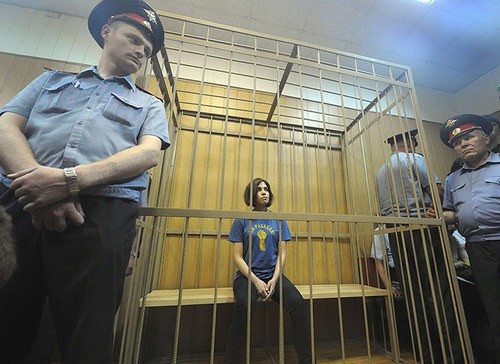It’s been a week since the guilty verdict came down for the three members of the Russian punk band Pussy Riot. The all-female riot grrrl group was arrested in March on charges of hooliganism after it performed an electrifying anti-President Putin song inside a Russian Orthodox church.
The amount of support for Maria Alyokhina, Yekaterina Samutsevich and Nadezhda Tolokonnikova has been staggering, but with their sentencing comes the question of what to take away from this injustice. In a country like the United States, where freedom of expression is so fiercely protected, the support for Pussy Riot that has permeated the national consciousness is almost redundant. The lightning rod nature of Pussy Riot’s case is the kind of thing that drives the artistic world to create works about issues of social justice — and yet, American musicians know they will never have to worry about finding themselves in Pussy Riot’s position.
Even in the short time since the arrests, many industry figures have spoken out in support of what Pussy Riot stands for. Due to Pussy Riot’s political fearlessness, exuberant live performances and overtly feminist lyrics, the group has drawn comparisons to the riot grrrl movement of the 1990s. Just as that movement energized a generation of musicians and women, the attention that Pussy Riot has received has led many to view the band as similarly inspiring. “It would be really cool if this reinvigorated feminists from all over the world,” de facto riot grrrl leader Kathleen Hanna said in an interview with Pitchfork. Among other public supporters of Pussy Riot, including Sting and Madonna, Hanna’s sentiment really embodies the industry-wide support behind the group, as the group’s case represents commitment to artistic freedom and expression.
Still, in the ongoing debate, there’s the issue of whether or not the suppression of artistic expression is even the main point of it all, given the more looming issue of the Russian political and legal systems. Some have voiced concern for the other political victims of Russia’s unjust rulings, those who weren’t lucky enough to have their cases so well publicized. In an article written for The Atlantic, writer Joshua Foust argues that the hype surrounding Pussy Riot is akin to the stupendous uproar over Joseph Kony earlier this year, “an unfortunate practice of activism for the sake of activism.”
Although the verdict has been made, it seems as though Pussy Riot’s international influence is holding strong. For the past few months, Pussy Riot has inspired the world to consider the power of musicians in bringing political injustice to the forefront, even if at the personal expense of three punk rock feminists. If nothing else, there’s always the seven free members of Pussy Riot still running around to keep us all on our toes.
Follow us on Twitter @wildcatarts.









